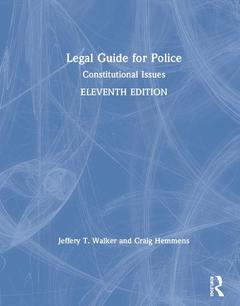Description
Legal Guide for Police (11th Ed.)
Constitutional Issues
Authors: Walker Jeffery T., Hemmens Craig
Language: English
Keywords
Fourth Amendment; Bill of Rights; Circuit Court; Fourteenth Amendment; Plain View Doctrine; criminal procedure; Search Incident; Supreme Court; Fourteenth Amendment Due Process Clauses; police authority; Good Faith Exception; due process; Pretrial Identification Procedures; exclusionary rule; Drug Detection Dog; civil liability; Impeachment Purposes; civil rights; Custodial Interrogation; stop-and-risk rationale; In-Court Identification; search and seizure; Qualified Immunity; arrest; probable cause; Warrantless Search; pretrial identification; Self-incrimination Provisions; Miranda rule; Exigent Circumstances; right to counsel; Public Safety Exception; questioning suspects; Miranda Warnings; warrant requirement; Investigatory Stop; US Constitution; Inventory Search; Due Process Model; BAC Test; Consensual Encounter; Sobriety Checkpoints; Crime Control Model
Approximative price 184.47 €
In Print (Delivery period: 14 days).
Add to cartPublication date: 02-2019
· Hardback
Approximative price 50.12 €
In Print (Delivery period: 14 days).
Add to cartPublication date: 02-2019
· Paperback
Description
/li>Contents
/li>Readership
/li>Biography
/li>
Legal Guide for Police: Constitutional Issues, 11th Edition, is a valuable tool for criminal justice students and law enforcement professionals, bringing them up-to-date with developments in the law of arrest, search and seizure, police authority to detain, questioning suspects and pretrial identification procedures, police power and its limitations, and civil liability of police officers and agencies. Including specific case examples, this revised edition provides the most current information for students and law enforcement professionals needing to develop an up-to-date understanding of the law.
Authors Walker and Hemmens have included introductory and summary chapters to aid readers in understanding the context, importance, and applicability of the case law. A new chapter covers warrantless searches involving cell phones and other technology, as well as vehicles. All chapters have been updated to reflect U.S. Supreme Court decisions up to and including the 2018 term of court. Important cases added to this edition include: Riley v. California (2014), Florida v. Jardines (2013), Birchfield v. North Dakota (2016), Heien v. North Carolina (2014), and Byrd v. United States (2018). A helpful Appendix contains the Bill of Rights and the Fourteenth Amendment, and a Table of Cases lists every case referenced in the text.
Also available as an audiobook.
Chapter 1. Introduction; Chapter 2. Results of Failure to Comply with Constitutional Mandates; Chapter 3. Police Power and Limitations; Chapter 4. Police Authority to Detain; Chapter 5. Law of Arrest; Chapter 6. Search and Seizure with a Warrant; Chapter 7. Search and Seizure without a Warrant; Chapter 8. Specialized Searches Without a Warrant: Vehicles, Dogs, and Technology; Chapter 9. Questioning Suspects; Chapter 10. Pretrial Identification Procedures; Chapter 11. Taking the Law to the Streets
Jeffery T. Walker is a Professor and Chair of the Department of Criminal Justice at the University of Alabama, Birmingham. Dr. Walker has written 10 books and almost 100 journal articles and book chapters. He has obtained over $12 million in grants from the Department of Justice, National Institute of Drug Abuse, National Science Foundation, and others. His areas of interest are social/environmental factors of neighborhoods, legal issues of policing, and crime mapping/crime analysis. He is a past President of the Academy of Criminal Justice Sciences. Editorial experience includes service as Editor of the Journal of Criminal Justice Education. Previous publications include articles in Justice Quarterly, Journal of Quantitative Criminology, and Journal of Criminal Justice Education, and the books Leading Cases in Law Enforcement (10th Edition) and Foundations of Crime Analysis. Dr. Walker also served as a Special Agent with the Air Force Office of Special Investigations (AFOSI), conducting major felony crime investigations. In September 2001, Dr. Walker was mobilized to provide counterintelligence, protective services, and force protection support to military personnel in U.S. and overseas locations. His final assignment was Superintendent of Counter-intelligence Investigations at Headquarters/AFOSI in Washington, D.C.
Craig Hemmens is a Professor in the Department of Criminal Justice and Criminology at Washington State University. He has previously served as Chair of the Department of Criminology and Criminal Justice at Washington State University, at the Department of Criminology and Criminal Justice at Missouri State University, and at the Department of Criminal Justice at Boise State University. He is a past President of the Academy of Criminal Justice Sciences. Professor Hemmens has published 20 books and more than 200 articles on a variety of criminal justice-related topics. He



